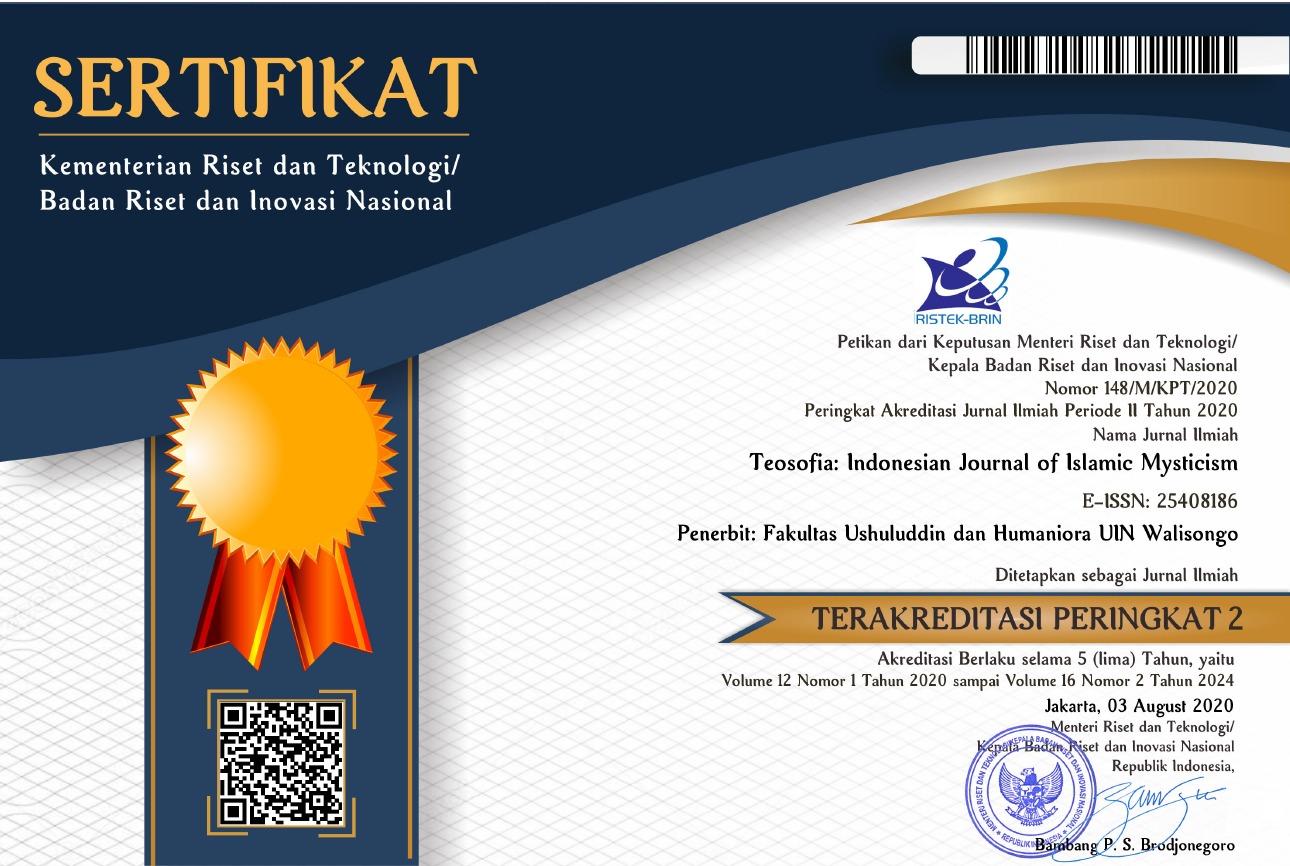Sir William Jones (1746–1794) and the Early Orientalist Discourse on Sufism
DOI:
https://doi.org/10.21580/tos.v10i1.9190Keywords:
Sufism, Islamic Mysticism, British Orientalist, Sir William JonesAbstract
Many theories have been proposed to discuss Sufism in terms of its linguistic origins and its role in spiritual knowledge, its concepts and ideas, and cultural influences. Both Muslim and orientalist scholars have offered opposing views on the beginnings of Sufism. Unfortunately, Western orientalists were the first to research this topic, and their ideas greatly influenced later scholars. This study examines how early British orientalists, particularly Sir William Jones, approached the study of Sufism. Jones represents the early development of British orientalism, which started in the form of personal travel accounts long before orientalist societies were established to support them. Only the later ‘experts on the Orient’ created scholarly circles that followed a more objective and systematic approach to studying Muslim cultures, yet often persisted in the erroneous claim that Sufism was an external and foreign element in Islamic culture.Downloads
References
Amirmiya, Saiyed Samirmiya. “Foundation of the Asiatic Society and the Discoveries of Cultural and Literary History of India.” International Journal of Research and Analytical Reviews 6, no. 1 (2019): 139–41.
Arberry, Arthur John. An Introduction to the History of Sufism. London: Orient Longman, 1942.
———. “Islamic Literature: Persian.” In Near Eastern Culture and Society A Symposium on the Meeting of East and West, edited by T. Cuyler Youngs. Princeton: Princeton University Press, 1951.
———. Oriental Essays, Portraits of Seven Scholars. London: Curzon Press, 1960.
Avcıoğlu, Gemze Gizem. “Sa’di Sîrâzî’nin Hayatı, Eserleri ve Türk Edebiyatındaki Yeri.” Istanbul Üniversitesi, 2018.
Biddulph, William. “The Travels of Certain Englishmen.” In Early Modern Tales of Orient, edited by Kenneth Parker. London, New York: Routledge, 1999.
Boivin, Michel. “Knowledge, Sufism, and the Issue of a Vernacular Literature.” In The Sufi Paradigm and the Makings of a Vernacular Knowledge in Colonial India, 95–113. Cham: Springer International Publishing, 2020. https://doi.org/10.1007/978-3-030-41991-2_4.
Bulut, Yücel. “Oryantalizmin Tarihsel Gelişimi Üzerine Bazı Değerlendirmeler.” Marife Dergisi 3, no. 2 (2002): 13–38.
Cannon, Garland. The Life, and Mind of Oriental Jones. Cambridge: Cambridge University Press, 1991.
Ciutacu, Sorin. “Arabia in the Early Modern European Mind. Representations of Arabia in Early Modern European Maps.” Analele Universităţii de Vest Din Timişoara. Seria Ştiinţe Filologice, no. 57 (2019): 139–44.
Davutoğlu, Ahmet. “Batıdaki İslam Çalışmaları Üzerine.” Marife 3, no. 2 (2002): 39–52. https://doi.org/10.5281/zenodo.3343235.
Demir, Serkan. “Akdeniz’de Korsanlar Ve Esirler Bağlamında Joseph Pıtts Ve Esâretnâmesi.” Hacattepe Üniversitesi, 2020. http://hdl.handle.net/11655/22576.
Derin, Süleyman. İnggiliz Oryantalizmi ve Tasavvuf. Istanbul: Küre Yayınları, 2006.
———. “İngiliz Oryantalistlerinin Tasavvuf Araştırmalarına Katkıları.” Türkiye Araştırmaları Literatür Dergisi 16, no. 21–32 (2018): 177–96.
Ernst, Carl W. “Commentary on Part I: Ambiguities and Ironic Reversals in the Categorization of Sufism.” In Modern Sufis and the State, edited by Katherine Pratt Ewing and Rosemary R. Corbett, 73–78. West Sussex: Columbia University Press, 2019. https://doi.org/10.7312/ewin19574-007.
———. Sufism: An Introduction to the Mystical Tradition of Islam. Boulder, Colorado: Shambhala Publication, 1997.
———. “The Dabistan and Orientalist Views of Sufism.” In Sufism East and West: Mystical Islam and Cross-Cultural Exchange in the Modern World, edited by Jamal Malik and Saeed Z. Zarrabi. Leiden: Brill, 2019.
Fani, Mohsin. The Dabistan or the School of Manners. Translated by David Shea and Anthony Troyer. Vol. iii. Paris, 1843.
Foster, Sir William. An Account by Joseph Pitts of His Journey from Algiers to Mecca and Medina and Back. United Kingdom: Millwood, 1990.
Gholi, Ahmad. “Reiteration of Prophet Muhammad’s Myths in Biddulph and Cartwright’s Travelogues.” Mediterranean Journal of Social Sciences 7, no. 1 (January 5, 2016): 251–58. https://doi.org/10.5901/mjss.2016.v7n1s1p251.
Jones, William. Al-Sirajiyah or the Muhammadan Law of Inheritance. Edited by Almeric Rumsey. London: Law Bookseller and Publisher, 1869.
———. “An Essay on the Poetry of the Eastern Nations.” In The Works of Sir William Jones, edited by Lord Teignmouth, 329–60. Cambridge: Cambridge University Press, 1807. https://doi.org/10.1017/CBO9781139506991.024.
———. “Histoire de Nader Chah.” In The Works of Sir William Jones, edited by Lord Teignmouth, xi–xii. Cambridge: Cambridge University Press, 1807. https://doi.org/10.1017/CBO9781139507004.001.
———. “The Sixth Discourse on the Persian.” In Works, Vol. iv. London, 1807.
Kahraman, Kemal. “Jones William.” DIA. Istanbul, 2001.
Kalinowska, Anna. “An Englishman In-between Two Worlds: Robert Bargrave’s Travel through East-Central Europe, 1652-1653.” Studia Historyczne 61, no. 4 (244) (June 1, 2021): 45–54. https://doi.org/10.12797/SH.61.2018.04.03.
Khalil, Atif. Repentance and the Return to God: Tawba in Early Sufism. New York: Suny Press, 2018.
Khalil, Atif, and Shiraz Sheikh. “Sufism in Western Historiography: A Brief Overview.” Philosophy East and West 66, no. 1 (2016): 194–217. https://doi.org/10.1353/pew.2016.0022.
Lawrence, Jonathan. “Building a Library: The Arabic and Persian Manuscript Collection of Sir William Jones.” Journal of the Royal Asiatic Society 31, no. 1 (January 9, 2021): 1–70. https://doi.org/10.1017/S1356186320000607.
Lewis, Bernard. British Contribution to Arabic Studies. Oxford: Oxford University Press, 1961.
Lord Dundonald, George Stephenson, Nelson, Napoleon, Captain Cook, George Washington, Walter Scott, et al. Famous Men, Being Biographical Sketches from Chamber’s Miscellany. London: Chamber’s Miscallany, 1892.
Nasir, Sari J. The Arabs and the English. London: Longman Group, 1976.
Nicholay, Nicolas de. The Navigations into Turkiye. Amsterdam: Theatrum Orbis, 1968.
Ockley, Simon. “Introduction.” In The Improvement of Human Reason Exhibited in the Live of Hay Ibn Yaqzan. London, 1708.
Özen, Deniz. “Sûdî’nin Hâfız-ı Şirâzî Dîvânı Şerhi: 75a-99b Varakları Arası Transkripsiyonlu Metin-İnceleme.” Binali Yıldırım Üniversitesi, 2018.
Parker, Kenneth. “Introduction.” In Early Modern Tales of Orient, A Critical Anthology. London: Routledge, 1999.
Rahman, F. “’Arad.” In Encyclopaedia of Islam, Second Edition, edited by P. Bearman, Th. Bianquis, C.E. Bosworth, E. van Donzel, and W.P. Heinrichs. Leiden: Brill, 2012. https://doi.org/10.1163/1573-3912.
Riach, Alan. “Odd Fellows: Alan Riach Examines the Colorful Work of William Lithgow and Thomas Urquhart.” The National, April 7, 2017.
Rice, Cyprian. The Persian Sufis. London: George Allen & Unwin, 1964.
Rosli, Ummi Nadhirah, and Noritah Omar. “References of Sexuality in Relation to the Prophet Muhammad (PBUH) in 17th-19th Century: Selected French and English Orientalist Travelogues.” Arab World English Journal For Translation and Literary Studies 1, no. 4 (October 15, 2017): 68–82. https://doi.org/10.24093/awejtls/vol1no4.5.
Sadia, Khadija. “Akbar’s Religious Reforms: Unifying Mortal Enemies.” Northern Illinois University, 2019.
Sağlık, Haci. “Kalenderî Bir Sûfî Olarak Baba Tâhirê Uryân.” E-Şarkiyat 10, no. 2 (May 30, 2018): 708–23. https://doi.org/10.26791/sarkiat.368830.
Uždavinys, Algis. “Sufism in the Light of Orientalism.” Acta Orientalia Vilnensia 6, no. 2 (January 1, 2005): 14–125. https://doi.org/10.15388/AOV.2005.0.3966.
Watkin, Owen. “Sir William Jones (1746-1794) and Islamic Studies.” University of Wales, 2013.
Yaman, Hikmet. “İsmi Olmayan Bir Hakikatten Hakikati Olmayan Bir İsme Varan Yolculuk.” Akademiar Dergisi 1, no. 1 (2016): 15–48.
Yıldırım, M. Ibrahim. “Abdullâh Hâtifî’nin Hayati Ve Bir Tarih Kaynaği Olarak Timurnâme’sinin Değeri.” TÜRKİYAT MECMUASI 28, no. 2 (December 18, 2018): 231–54. https://doi.org/10.18345/iuturkiyat.497592.
Downloads
Published
How to Cite
Issue
Section
License
Copyright
The copyright of the received article shall be assigned to the journal as the publisher of the journal. The intended copyright includes the right to publish the article in various forms (including reprints). The journal maintains the publishing rights to the published articles. Therefore, the author must submit a statement of the Copyright Transfer Agreement.*)
Licensing

This work is licensed under a Creative Commons Attribution-ShareAlike 4.0 International License.
In line with the license, authors are allowed to share and adapt the material. In addition, the material must be given appropriate credit, provided with a link to the license, and indicated if changes were made. If authors remix, transform or build upon the material, authors must distribute their contributions under the same license as the original.
_______
*) Authors whose articles are accepted for publication will receive confirmation via email and send a Copyright Transfer Agreement.








